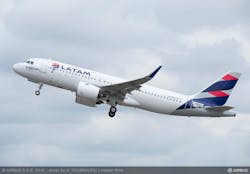LATAM Renews Its Fleet and Expects to End 2023 With 31 a320neo Family Aircraft
With the commitment to be more efficient and sustainable, the LATAM group advances in the renewal of its fleet, announcing that it will have 31 A320neo family aircraft in operation by the end of 2023.
The additional purchase of Airbus aircraft will allow the group to have more than 100 A320neo, A321neo and A321XLR aircraft by the end of this decade. Today, the LATAM group has 16 Airbus A320neo aircraft in operation and this year it expects to receive another 15 Airbus aircraft, including the first A321neo in its fleet. The first A321XLR will be delivered in 2025.
This will allow the LATAM group to replace its aircraft with more modern and efficient ones, increase its fleet and continue with the recovery of its operation compared to pre-pandemic levels.
"The renewal of the fleet that we are carrying out is fully aligned with our commitment to sustainability and brings us closer to the goal of becoming a carbon neutral group by 2050. The Airbus A320neo aircraft has more efficient engines, aerodynamic improvements and technologies that provide a 20% lower fuel consumption, with a 50% reduction in nitrogen oxide emissions,” said Sebastián Acuto, Director of Fleet and Projects, LATAM Airlines Group.
Regarding the Airbus A321neo, it consumes 22% less fuel per seat than the previous model, the A320ceo. In addition, the Airbus A321XLR is the single-aisle aircraft (narrow-body) with the longest flight range in the world (7,400 km) and with up to 38% less fuel consumption per flight than an aircraft with two aisles (wide body).
Most of LATAM's A320 Family aircraft fleet is equipped with software that reduces annual CO2 emissions by more than 60,000 tons by optimizing the aircraft's landing path.
Currently, the LATAM group has 311 aircraft, 57 passengers Boeing (767, 777 and 787 models) and 238 Airbus aircraft (A319, A320, A320neo and A321 models). In addition, LATAM Cargo Chile, LATAM Cargo Colombia and LATAM Cargo Brazil have a joint fleet of 16 cargo planes, which will gradually expand to 20 cargo planes by 2024.


